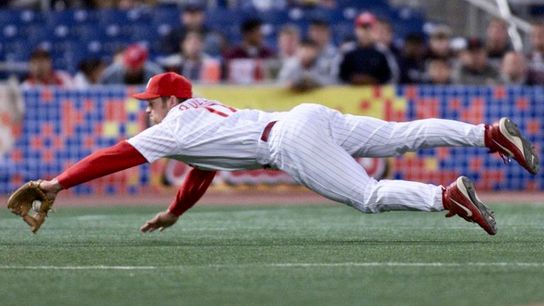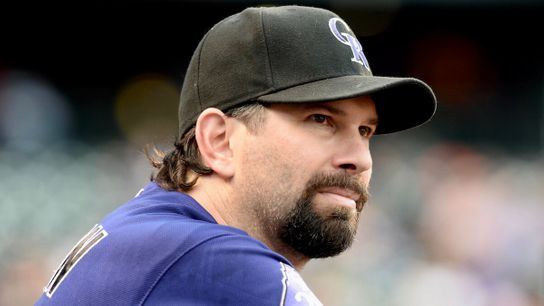No, I didn't submit an empty Baseball Hall of Fame ballot.
But when my annual research period began in late November, trust me when I acknowledge I started with one name alone, that being Curt Schilling, the only holdover from the previous year. And trust me further that, if Schilling had brought my only checkmark, it would've come without apology.
There's nothing sillier than the arcane -- and wholly unwritten -- rule that the voting members of the Baseball Writers Association of America are somehow derelict in duty by not voting for the maximum 10 choices on the ballot. I'm not sure when this thought process or practice began, just that it must've been way before this, my fifth year of voting. And I'm thankful for that.
My own thought process, condensed:
1. Does a player belong?
2. Check.
Quite the concept, huh?
I don't care if it's a guy's first year or 10th year. I don't care other voters habitually choose 10. I don't care if I submit 10 players or no players or any number in between. I don't care if the average number of players voters have chosen so far is 6.47 per ballot. And I absolutely don't care about any reaction anyone anywhere would have to any number I'd submit.
There's nothing in the voter guidelines stipulating choosing any number, no minimum. Just that you can't have more than 10. That's it.
Well, with all due respect to old friends A.J. Burnett and Aramis Ramirez, both of whom had fine careers here in Pittsburgh and elsewhere, neither belongs in Cooperstown. And neither does almost all of the rest of this list. It's not a great class, to be kind. Most players could be dismissed with a casual glance, some because of performance, some because they were known cheaters, some because of both.
When there's a great class, man, let's go nuts and get 10 of them inducted. I'm all for it.
But forcing it?
And the people who submit a ballot with a low number invariably get accused by the witch-hunt types of attempting some stupid protest -- uh, to what end? -- or calling attention to themselves?
Seriously, why?
Still, I did revisit a couple names I'd strongly considered the previous year -- I do that all the time, to be doubly fair to all involved and apply sufficient study, as well as weighing new arguments -- and I'm happy to say, as I'll illustrate below, I added two names to Schilling's. Neither is among the new players added to the ballot, but both are new to mine.
MY BALLOT
Before continuing on to further ranting, here are the selections I made for the pending class before the Hall’s Dec. 31 deadline:
Todd Helton
Scott Rolen
Curt Schilling
A year ago, I finally came around on Larry Walker, thanks in large part to a direct outreach this way from the Canadian Baseball Hall of Fame, a wholly separate institution, and some compelling advanced data to make the case that he was being unjustly punished for playing most of his career in Denver. I was delighted, after that, to see Walker make it in his 10th and final year.
Well, I focused a lot of those same principles this year on Helton and came away with a case for him, too.
I enjoyed watching Helton at Three Rivers Stadium, PNC Park and, of course, Coors Field. The man hit the ball hard. I mean hard. And he did so everywhere while spending all 17 of his seasons with the Rockies, a feat in and of itself in modern professional sports. He was a fixture at first base, in the Colorado lineup and as a presence in the National League.
But hey, it's not like we all don't carry some bias toward the Rockies hitting. My goodness, we've seen the worst Pittsburgh teams fly a mile high and suddenly put up 10 or 12 runs in a game.
Here's the argument-ender for me with Helton: Baseball Reference's neutralized-stats option, which removes all ballpark-altitude-humidor effects, and has Helton with a .302/.398/.512 slash line that’s worthy of Cooperstown.
Oh, and this, too: Most statistical measures show that Helton was the third-best position player in baseball in 2000-04. The only two ahead of him were two cheaters: Barry Bonds and Alex Rodriguez. Whereas Helton never had so much as a sniff of suspicion attached to him. And in 2000, specifically, Helton won the league batting crown with a .372 average, as well as 42 home runs, 59 doubles and 147 RBIs, figures that are otherworldly no matter where he played.

AP
The Phillies' Scott Rolen.
Rolen's a different matter for me.
When he ascended with the Phillies, I probably wasn't the only one who thought of him and Mike Schmidt in the same capacity, playing the same position for the same team. There was immense respect, of course, as he could pick the ball as beautifully as he could pulverize it. But ... man, this'll sound unfair, but he wasn't Schmidt, you know? If only because no one ever will be.
And then, when he'd end up bouncing around to the Cardinals, Blue Jays and Reds, even though he continued to perform well, it felt from afar as if maybe some of that had been lost.
Observations like these mean next to nothing, I should note here. Same goes for the one I mentioned regarding Helton. But I'm a human, and a human who's loved baseball his whole life, so it feels right to let you know everything I experience along the way.
Infinitely more important, Rolen, like Helton, has Cooperstown written all over him: .281/.364/.490 plus seven All-Star selections, eight Gold Gloves -- only Brooks Robinson and Schmidt had more at third base -- and a brilliant .421 World Series for the Cardinals in 2006. And there's his 70.1 WAR, 10th-best among third basemen in history. Eight others out of that 10 are already in the Hall, and Adrian Beltre's likely on his way.
Again, Schilling’s my only holdover and, as ever, is a strange case worth retelling.
I voted for him in 2016, as his baseball credentials clearly warrant that. But he went so far beyond the pale with some remarks and actions after that — look them up, this guy isn’t worth my time — that I felt he crossed into foul territory of the character section of the qualifications. That’s obviously subjective. Someone else might see it differently. But again, that’s why there are a lot of us doing this voting.
At any rate, Schilling hasn’t caused any stir since then, and he’s been back on my ballot three years in a row.
I’m allowed to still hope he gets a flat tire on the way to the ceremony, right?
THE BACKGROUND
For anyone new here, here are the three standards for voting I’ve set for myself that I’ve shared with each of my four ballots to date:
1. The research I’ve committed to this was almost entirely my own. I studied my own finalists’ histories in as many forms as I could find, from old stats to new, from major achievements to memorable impact.
2. The approaches to difficult decisions were based on a combined goal of careful thought, consistent applications of my own precedents, but also an open mind to conceding when I might have been wrong.
3. The guidelines I’ve followed are those outlined for us by the BBWAA, which also happen to be the very same guidelines the Hall wrote for the very first class in 1936. And you’d better believe that includes the character clause, which hasn’t changed over all these years. (If you want to yell at someone about Cobb having been one very bad dude, they’re probably no longer around to hear it.)
Here’s the official clause, by the way, verbatim: “5. Voting: Voting shall be based upon the player’s record, playing ability, integrity, sportsmanship, character, and contributions to the team(s) on which the player played.”
THE CHEATERS
A few points on the cheaters, since that tends to consume only about 99 percent of all Hall debates:
• When the Hall and/or Major League Baseball decides it wants the voters to stop weighing “integrity, sportsmanship, character,” they can remove that clause. They’re the only ones empowered to do that. Not the writers. Only them.
• It’s become the cool thing in some circles to dismiss PEDs as if they shouldn’t matter to the Hall. Which is nonsense. Cheating is cheating. It runs counter to the very fabric of sportsmanship, and thus, sport.
• Anyone who took issue with the Astros' cheating but ignores this cheating ... wow, I'll let those people fend for themselves. That's a hypocrisy at a level I can't even grasp.
• It’s become equally cool to bash the BBWAA for acting as holier-than-thou or judge, jury and executioner. This also is nonsense, for the reason I just outlined and for the fact the Hall and MLB are all too happy to pass the buck to the writers. They keep out the players they don’t want in the Hall, and we get the grief.
Which, to be totally honest, is fine by me. I’ll follow the guidelines precisely as written and weigh “integrity, sportsmanship, character,” with an inclusion of those connected to PEDs, because cheating the public, your peers and the game doesn’t exactly fit any of those three traits.
In other words, I’ll vote for Bonds and his ilk only when the guideline is changed by the Hall and/or MLB. But I’m not holding my breath. To repeat, they don’t want Bonds in the Hall. Unless, of course, they can explain why the former commissioner essentially refused to acknowledge Bonds breaking the most hallowed record in our nation’s long sporting history.
Anyway, no need to end this on a down note. The Hall itself and America’s pastime as a whole should be celebrated, and I extend best wishes to all three of the athletes above. The results will be announced Tuesday, Jan. 26, 2021, at 6 p.m. on MLB Network.

